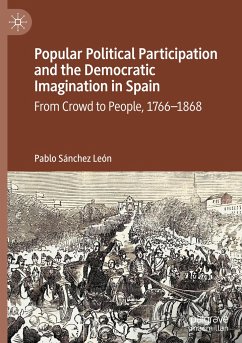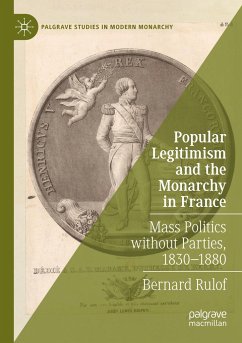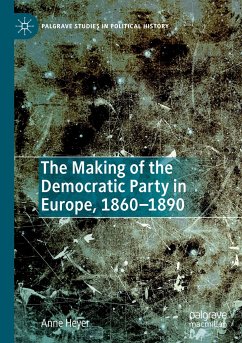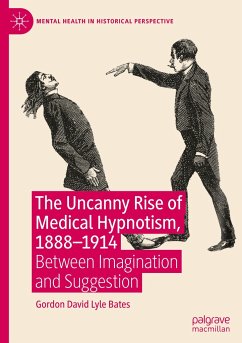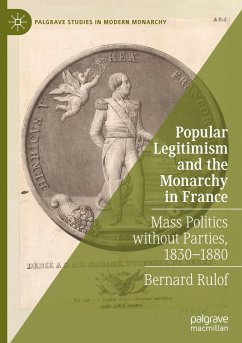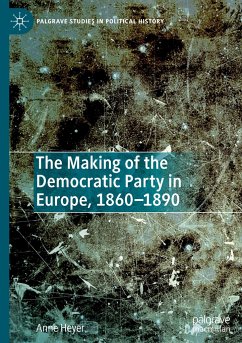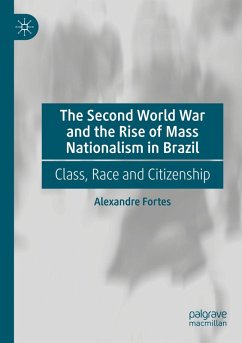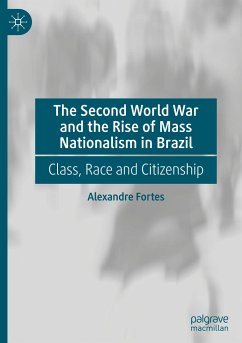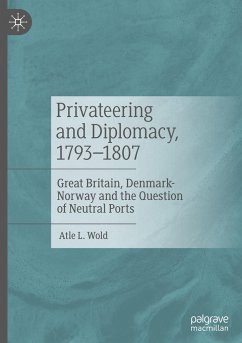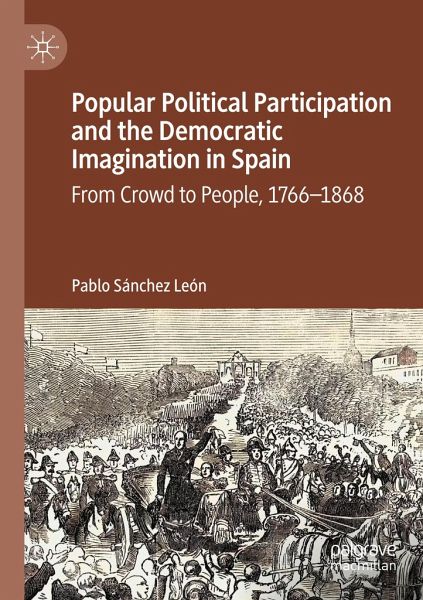
Popular Political Participation and the Democratic Imagination in Spain
From Crowd to People, 1766-1868
Versandkostenfrei!
Versandfertig in 6-10 Tagen
98,99 €
inkl. MwSt.
Weitere Ausgaben:

PAYBACK Punkte
49 °P sammeln!
This book addresses the changing relationships among political participation, political representation, and popular mobilization in Spain from the 1766 protest in Madrid against the early Bourbon reforms until the citizen revolution of 1868 that first introduced universal suffrage and led to the ousting of the monarchy.Popular Participation and the Democratic Imagination in Spain shows that a notion of the "crowd" internally dividing the concept of "people" existed before the advent of Liberalism, allowing for the enduring subordination of popular participation to representation in politics.In...
This book addresses the changing relationships among political participation, political representation, and popular mobilization in Spain from the 1766 protest in Madrid against the early Bourbon reforms until the citizen revolution of 1868 that first introduced universal suffrage and led to the ousting of the monarchy.
Popular Participation and the Democratic Imagination in Spain shows that a notion of the "crowd" internally dividing the concept of "people" existed before the advent of Liberalism, allowing for the enduring subordination of popular participation to representation in politics.
In its wider European and colonial American context, the study analyzes semantic changes in a range of cultural spheres, from parliamentary debate to historical narrative and aesthetics. It shows how Liberalism had trouble reproducing the legitimacy of limited suffrage and traces the evolution of an imagination on democracy that would allow for the reconfigurationof an all-encompassing image of the people eventually overcoming representative government.
"Focused on the nation and identities, Spanish historiography had a pending debt with that other historical subject of modernity, the people. With this book, Pablo Sánchez León starts cancelling the debt with an innovative methodology combining conceptual history with social and political history. Brilliantly, this books also proposes a novel chronology for modern history and renewed categories of analysis. In many senses, this is an extraordinarily renovating senior work."
-José María Portillo Valdés, University of the Basque Country, Spain
"This book by Pablo Sánchez León is an original and detailed study of one of the essential components of modernity, the relation between the concepts of plebe and pueblo. The author shows that plebe and people were shaped in a process of mutual differentiation and how the enduring tensionbetween them deeply marked out the evolution of Spanish politics from the end of the Old Regime and throughout the 19th century. As the author brilliantly argues, such tension is tightly imbricated with the enduring dilemma between representation and participation underlying modern political systems. Through a historical analysis of the influence of people and plebe over Spanish, the book makes clear the degree to which the power of language contributes to shape political actors and institutional frames."
-Miguel Ángel Cabrera - Professor, University of La Laguna, Tenerife, Spain
"Most accounts of Spain's transition to modern democracy begin with the popular uprising against the French invasion in 1808, the creation of a national parliament and the promulgation of an advanced Liberal constitution in 1812. Pablo Sánchez León begins the story half a century earlier in the mass street protests in Madrid and other cities in 1766 sparked byCharles III's sweeping reform programme. Sánchez León focuses unrepentantly on plebeian groups and crowd action - how they are described and conceived by contemporaries - as a key to understanding Spain's precocious and troubled passage from absolutism to the promulgation of universal male suffrage in September 1868. This audacious and highly original interpretation will surely strike a chord with students of modern Spain."
-Guy Thomson, University of Warwick, UK
"This is a book for exploring (from current needs) the history of political participation in Spanish society in order to rethink the very notion of modern citizenship."
-María Sierra, University of Seville, Spain
"Motivated by the current crisis in political representation in parliamentary democracies, this work by Pablo Sánchez León departs from the process of construction of modern citizenship. Representation, participation and mobilization are put into play as an interactive triad whosedyna
Popular Participation and the Democratic Imagination in Spain shows that a notion of the "crowd" internally dividing the concept of "people" existed before the advent of Liberalism, allowing for the enduring subordination of popular participation to representation in politics.
In its wider European and colonial American context, the study analyzes semantic changes in a range of cultural spheres, from parliamentary debate to historical narrative and aesthetics. It shows how Liberalism had trouble reproducing the legitimacy of limited suffrage and traces the evolution of an imagination on democracy that would allow for the reconfigurationof an all-encompassing image of the people eventually overcoming representative government.
"Focused on the nation and identities, Spanish historiography had a pending debt with that other historical subject of modernity, the people. With this book, Pablo Sánchez León starts cancelling the debt with an innovative methodology combining conceptual history with social and political history. Brilliantly, this books also proposes a novel chronology for modern history and renewed categories of analysis. In many senses, this is an extraordinarily renovating senior work."
-José María Portillo Valdés, University of the Basque Country, Spain
"This book by Pablo Sánchez León is an original and detailed study of one of the essential components of modernity, the relation between the concepts of plebe and pueblo. The author shows that plebe and people were shaped in a process of mutual differentiation and how the enduring tensionbetween them deeply marked out the evolution of Spanish politics from the end of the Old Regime and throughout the 19th century. As the author brilliantly argues, such tension is tightly imbricated with the enduring dilemma between representation and participation underlying modern political systems. Through a historical analysis of the influence of people and plebe over Spanish, the book makes clear the degree to which the power of language contributes to shape political actors and institutional frames."
-Miguel Ángel Cabrera - Professor, University of La Laguna, Tenerife, Spain
"Most accounts of Spain's transition to modern democracy begin with the popular uprising against the French invasion in 1808, the creation of a national parliament and the promulgation of an advanced Liberal constitution in 1812. Pablo Sánchez León begins the story half a century earlier in the mass street protests in Madrid and other cities in 1766 sparked byCharles III's sweeping reform programme. Sánchez León focuses unrepentantly on plebeian groups and crowd action - how they are described and conceived by contemporaries - as a key to understanding Spain's precocious and troubled passage from absolutism to the promulgation of universal male suffrage in September 1868. This audacious and highly original interpretation will surely strike a chord with students of modern Spain."
-Guy Thomson, University of Warwick, UK
"This is a book for exploring (from current needs) the history of political participation in Spanish society in order to rethink the very notion of modern citizenship."
-María Sierra, University of Seville, Spain
"Motivated by the current crisis in political representation in parliamentary democracies, this work by Pablo Sánchez León departs from the process of construction of modern citizenship. Representation, participation and mobilization are put into play as an interactive triad whosedyna





